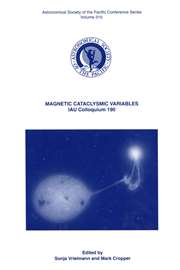No CrossRef data available.
Article contents
The Formation and Evolution of Low-Mass Close Binaries with Compact Components
Published online by Cambridge University Press: 12 April 2016
Abstract
We discuss the formation and evolution of interacting low-mass close binaries with a He-ICO- or ONe-dwarf neutron star or a black hole as a compact component. Mass exchange leads to cataclysmic events in such systems. The rate of semidetached low-mass close binary formation is 5×10−3 yr−1 if the accreting component is a He degenerate dwarf, 5×10−3 yr−1 if it is a CO-dwarf and 3×10−8 yr−1 if it is a neutron star. Systems with compact accretors arise as the result of the common envelope phase of close binary evolution or due to collisions of single neutron stars or dwarfs with low-mass single stars in dense stellar clusters. Evolution of LMCB to the contact phase in semi-detached stages is determined mainly by the angular momentum losses by a magnetic stellar wind and radiation of gravitational waves. Numerical computations of evolution with momentum loss explain observed mass exchange rates in such systems, the absence of cataclysmic variables with orbital periods 2h−3h, the low number and the evolutionary status of systems with orbital periods shorter than 80m. In conclusion we list unsolved problems related to magnetic stellar wind, the distribution of young close binaries over main initial parameters, stability of mass exchange.
Information
- Type
- I. Evolution
- Information
- Copyright
- Copyright © Reidel 1987

